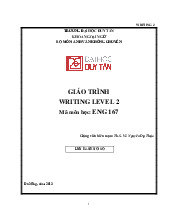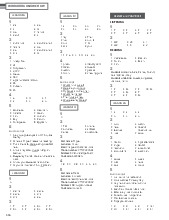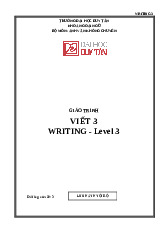


Preview text:
Preposition Other meanings:
Some prepositions of place have other meanings. There are two other meanings which I will present below.
First, some prepositions of place can also express time: For examples:
+ Lots of people work from nine o'clock to five.
In this sentence, when a starting time and a finishing time is mentioned, the
preposition 'from' is used to express the beginning and 'to' for the end. + The movie starts at 7:00.
“At” in this sentence is used for a specific time which is 7 0’clock.
+ They managed to finish the job in two weeks.
In this sentence “in” is used to describe the amount of time needed to do something.
+ She was born on Valentine’s Day.
In this case, “On” is used with speacial day. We can also use it in other
speacial days like birthday, Christmas Eve, Halloween,…
The second meaning and also the last is Prepositions of place can have more abstract meanings: For examples: -
Common prepositions that show relationships of space often have
abstract as well as concrete meanings.
+ “That map you need is behind the filing cabinet.” => The pp in this
sentence expresses the basic spatial sense or position. But in the
sentence “Everyone is behind the government.” The pp “behind” has the
same meaning as “gives support”.
+ “Beyond the hotel were beautiful mountains.”=> The pp in this
expresses the basic spatial sense or position. But in the sentence
“Learning Chinese in a year was beyond them all.” has the same
meaning as “too difficult”. -
Some common prepositions can have abstract meanings:
+ “All three singers were dressed in black.” Is the same to “ Three singers all wore black clothes”
+ “Ian comes from Scotland.” is the same to “He's Scottish” or “He lives in Scotland.”
+ “The party is right behind its leader.” is the same to “The party is supporting its leader”. -
For idioms, we have some examples like: + Come and look at the view.
+We spent an hour looking round the shops.
+Can you help me look for my cheque book?
+I had to stay at home to look after the dog.
+The police are looking into the incident.
+ People look on this neighbourhood as the least desirable in town.
In these sentence, there’are always have a verb stand before the pp. It
can’t be separated because it’ll just express the right meaning when it’s
in the right place. We can see, the verb standing before all the pp in each
sentences here. When they sticks together their has different meanings.
Look at : to think about something carefully so that you can make a decision about it.
Look round: move around a place or building in order to view whatever
it might contain that is of interest.
Look after: take care of someone or something.
Look into: investigate something.
Look on: think of or regard someone or something in a specified way.
Ok, this is the end of our team’s presentation. Thank you
everyone for listening and watching.



